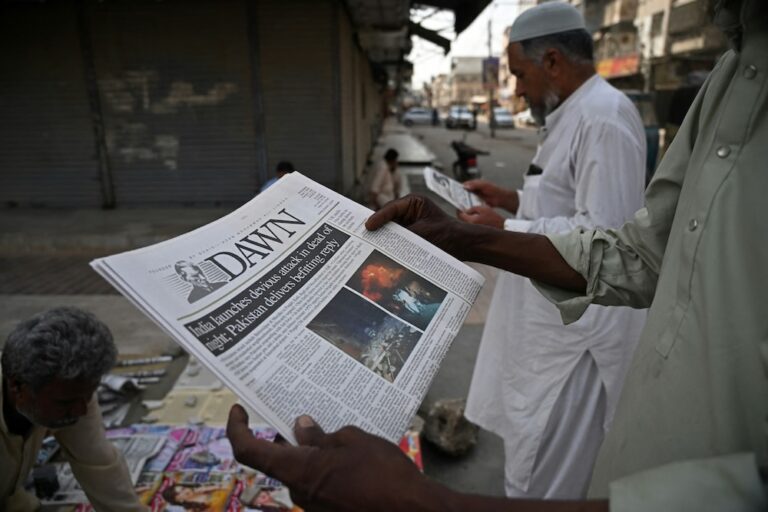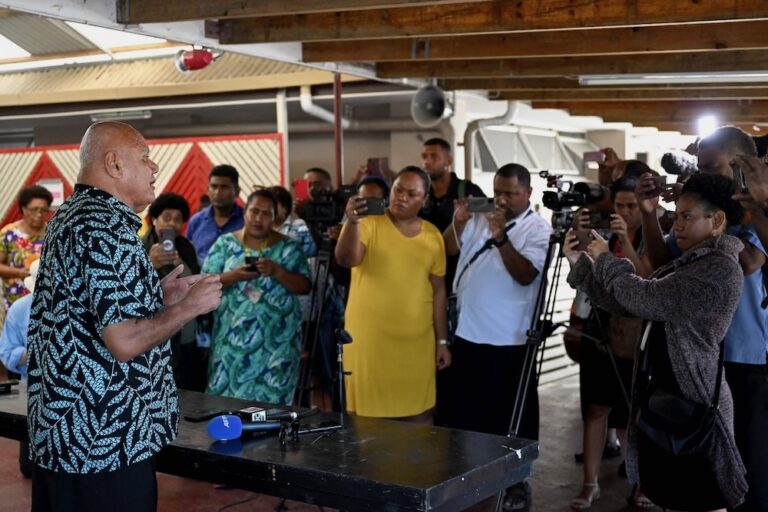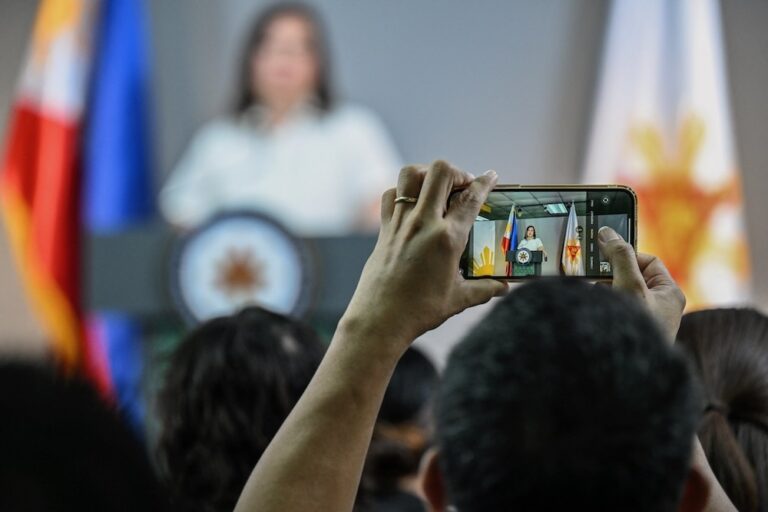April in Asia-Pacific: A free expression roundup produced by IFEX's regional editor Mong Palatino, based on IFEX member reports and news from the region.
The COVID-19 pandemic has enabled many governments in the region to ride roughshod over civil liberties. Repressive measures were enacted in the name of addressing a public health crisis. Vulnerable segments of the population found themselves facing not just a virus outbreak but a weaponized regime imposing control and order supposedly for public safety and the common good. This report supplements a mid-month regional brief published on 17 April.
Crackdown and discrimination during the pandemic
Hong Kong police arrested 15 prominent pro-democracy leaders for ‘organizing and participating in unlawful assemblies’ during the widespread protests in 2019. All 15 were released on bail and their trials are scheduled to begin on 18 May 2020. Jimmy Lai, the founder of Apple Daily newspaper, was among those arrested by the police. His arrest was described by the International Press Institute (IPI) as a signal that China “is moving to clamp down on independent media.”
Despite China’s notorious censorship regime, netizens have found ingenious ways to share COVID-19 information, organize help during the lockdown, and express outrage over the government’s handling of the crisis.
There has been a noticeable surge in anti-Muslim rhetoric in Sri Lanka and India. Sri Lanka Muslim organizations have asked authorities to combat rising religious discrimination and violence which undermine the safety and welfare of the Muslim community. Concerns include calls to boycott Muslim businesses, which were triggered by disinformation that accused Muslims of deliberately spreading the coronavirus. The government’s order to cremate COVID-19 fatalities was also cited as discriminatory to Muslims. The vitriol intensified further in the past month after well-known Muslims were arrested in relation to their alleged involvement in the 2019 Easter Sunday bombings.
India’s ruling party is accused of using the pandemic to demonize and discriminate Muslims in the country. Some officials have used phrases like ‘corona jihad’, ‘Talibani crime’, and ‘corona terrorism’ in accusing Muslim groups of being responsible for the virus outbreak. This has fueled anti-Muslim attacks in various communities.
UN High Commissioner for Human Rights Michelle Bachelet has called on governments to address the ‘toxic lockdown culture’ affecting the poor. She emphasized that human rights must be protected in implementing emergency measures related to COVID-19. Her office noted that the Philippines topped the list of countries that have been aggressively arresting alleged quarantine violators.
Freedom Forum has documented several cases that highlight unabated attacks against the Nepalese media during the pandemic. Since March, several journalists have been targeted for writing critical local stories on COVID-19, at least 22 news websites were blocked for alleged publication of disinformation, and some radio reports were censored for featuring the views of former officials.
Kashmir remains under ‘information blackhole’
Eight months in and counting, Kashmir remains the world’s biggest ‘information black hole’, causing acute suffering to its people. Various groups, including IFEX members, have called for the immediate restoration of 4G networks in Kashmir, for media to be allowed to do their work without restrictions, and for the safety and protection of journalists covering the COVID-19 pandemic.
Journalists face increasing repression. Police recently filed charges against three journalists for social media posts and reports that allegedly ‘glorify terrorism in the Kashmir Valley’ and ‘provoke the public to disturb the law and order.’ If found guilty, the journalists face up to seven years in jail.
‘Decongest prisons, release detained journalists’
Human Rights Watch (HRW) is petitioning governments in the region to release prisoners as an urgent measure to prevent a COVID-19 outbreak in overcrowded and unsanitary jails. It proposed the release of those detained for exercising their basic rights and those without charge or with low-level and non-violent offenses. It also mentioned the release of older prisoners and those with critical illnesses, for humanitarian reasons. It identified China, India, Thailand, Indonesia, and the Philippines among the top ten countries in the world with high prison populations. China’s case is even more worrisome if we include the estimated one million people held in ‘political education’ camps in Xinjiang, ‘black jails’, and ‘custody and education’ facilities across the country.
Meanwhile, the Committee to Protect Journalists (CPJ) and 73 other media and rights groups have written to the leaders of Cambodia, China, India, Myanmar, Pakistan, Philippines, and Vietnam urging the release of detained journalists amid the COVID-19 pandemic.
For journalists jailed in countries affected by the virus, freedom is now a matter of life and death.
Many of these journalists have been held in detention without trial for lengthy periods and are suffering from ill health exacerbated by underlying health conditions and overcrowded prisons, where they have contracted malaria, tuberculosis, and other diseases.
According to CPJ’s tally, there are at least 63 journalists in prisons in Asia, including 44 in China, 11 in Vietnam, 4 in India, and one in Pakistan, Myanmar, Cambodia, and the Philippines.
Workers stranded and abandoned
The 24 March announcement of the Indian government placing the entire country under lockdown caused mass panic and exodus of migrant workers from the cities to rural villages. As businesses closed, many workers lost jobs and social protection benefits. Some found assistance in government shelters but many were left to fend for themselves. Thousands were forced to walk for days to return to their homes as they struggled against hunger, unemployment, and social stigma.
Migrant workers in Nepal faced similar problems. Some analysts noted that displaced workers are dying – not because of COVID-19, but because of neglect and lockdown restrictions.
Women suffer more during the pandemic
Fifteen civil society groups in Cambodia have endorsed a paper outlining several demands aimed at preventing gender-based violence as the country deals with the spread of COVID-19. They emphasized that women frontline workers face increased risk of exposure to the virus. They warned that the pandemic could heighten risks of sexual harassment offline and online, especially for women in precarious economic situations
Women journalists in Afghanistan are often the first to be laid off or asked to work reduced hours as media outlets experience financial losses during the pandemic.
“Women journalists are not just the first victims of the climate of insecurity and the war but also the most exposed to COVID-19, as they are denied the resources for taking care of themselves,” said Farida Nekzad, the director of the Centre for the Protection of Afghan Women Journalists.
In brief: COVID-19 emergency measures
Japan passed a special measures law that gives the government the power to issue ‘instructions’ to select companies and associations, including the public broadcaster NHK. Reporters Without Borders (RSF) said the ‘ambiguous formulation’ in the law could ‘infringe on the media’s editorial independence.’ RSF is calling authorities to revise the law and ensure that it guarantees press freedom.
Cambodia’s Constitutional Council approved a law on 27 April which would allow the government to indefinitely renew the state of emergency, broaden the martial law powers of the executive, and legitimize arbitrary surveillance of private communications of citizens including media outlets.
On 4 April, Indonesia’s Criminal Investigation Agency issued an order directing the police’s cyber patrol to monitor and arrest those who post coronavirus-related hoaxes, online fraud regarding the sale of health equipment, and ‘hostile information about the president and government.’ Media groups said the order threatens to hamper the work of journalists aside from criminalizing legitimate criticism against public officials.
Malaysian civil society groups have expressed concerns over the statement of the National Security Council directing the police and the Ministry of Communications and Multimedia to take ‘stern action’ against online news websites that allegedly misreport government statements on COVID-19. Several media groups also criticized the release of an infographic detailing various types of ‘fake news’ which includes the posting of criticism against authorities.
Pacific Freedom Forum has reported that the Cook Islands has passed information restrictions imposing heavy fines and jail terms for those spreading ‘harmful information’ over the pandemic.
Vanuatu’s declaration of a state of emergency includes a provision which makes it illegal for “all media outlets to publish any articles on COVID-19, unless it has the respective authorisation by the National Disaster Management Office after consultation with the Ministry of Health.”



